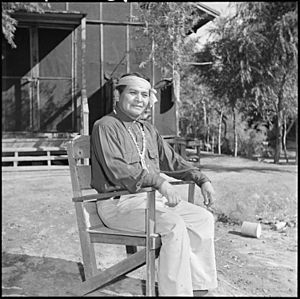Albert Yava facts for kids
Quick facts for kids
Albert Yava
|
|
|---|---|

Albert Yava in Poston, Arizona, September 1945
|
|
| Native name |
Nuvayoiyava
|
| Born | 1888 |
| Died | February 1980 (aged 91–92) |
| Occupation |
|
| Language | |
| Genre | |
Albert Yava (1888–1980) was an important Hopi–Tewa writer and interpreter. He was born in 1888 in Tewa Village on First Mesa, Arizona. His father was Hopi and his mother was Tewa. His birth name was Nuvayoiyava, which means "Big Falling Snow."
When he was young, Albert Yava went to primary school in Polacca, Arizona. At that time, it was a big discussion among the Hopi people whether children should have to go to US government schools. Teachers at the school shortened his name to Yava and added the name Albert. He used these names for the rest of his life. After primary school, Yava went to boarding schools in Keams Canyon, Arizona and Chilocco Indian School in Oklahoma. He spent five years at Chilocco.
Contents
Working for His Community
A Skilled Interpreter
In 1912, Albert Yava returned to the Hopi reservation. He started working for the Bureau of Indian Affairs (BIA) Hopi Agency in Keams Canyon. His job was a painter in the maintenance department.
He also used his amazing language skills as an interpreter. He knew Hopi, Tewa, and English very well. He even knew some Navajo. This made him very helpful in communicating between different groups.
Creating Bilingual Books
In 1943, Albert Yava helped create two special children's books. These books were published by the Bureau of Indian Affairs. What made them special was that they were bilingual, meaning they were in two languages: Hopi and English.
The books were called Field Mouse Goes To War / Tusan Homichi Tuvwöta and Little Hopi / Hopihoya. These were the first books of their kind for Native American education. They were based on real spoken Hopi stories. After World War II, the BIA changed its focus. They started to encourage Native Americans to adopt Western ways. Because of this, more efforts for bilingual education didn't happen for many years.
A Respected Elder
Sharing Hopi and Tewa Traditions
Later in his life, Albert Yava became a highly respected community elder. People looked to him as an expert on both Hopi and Tewa traditions. He was considered a member of the Tewa moiety (a group based on family ties) through his mother's side. He also became a member of the Hopi One Horn kiva society. This meant he was deeply connected to both the Tewa and Hopi communities.
Recording His Life Story
From 1969 to 1977, Albert Yava met with an anthropologist named Harold Courlander. An anthropologist is someone who studies human societies and cultures. Yava shared many stories and memories with Courlander. He talked about his own life, the history and traditions of the Hopi and Tewa people, and important issues affecting his community. This included the land disputes between the Hopi and Navajo.
These recordings were written down and put into a book by Courlander. The book was published in 1978 and was called Big Falling Snow: A Tewa-Hopi Indian's Life and Times and the History and Traditions of His People. People praised the book because of Yava's clear storytelling. They also liked how he showed the effects of Western culture on the Hopi people in a balanced way. His ability to connect Hopi ceremonial traditions with Western ways of thinking was also highly regarded.
Legacy
Albert Yava passed away in February 1980. An article in the International Journal of American Linguistics honored him. It praised his amazing language skills and called him a "remarkable man." His book, Big Falling Snow, continues to be an important resource for understanding Hopi and Tewa culture and history.

